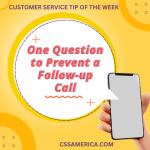I asked a couple friends who are much more scientifically-oriented the question: What is energy? I didn’t mean E=MC2. I meant physiologically, what is energy?
They described a lot of things that sounded really good, yet far too advanced for my non-medical mind.
Part of the reason why energy is of interest is…well…I always wish I had a little bit more. But as it relates to customer service, energy is of interest to discuss because it’s generally a good thing. Especially as an employee interacting with a customer, energy can convey interest. Energy can convey action. Energy can convey the willingness to do what is needed.
Apathy is the last thing you want to present to a customer. It conveys that you don’t care, you’re focused on something else, that they don’t really matter.
So how do you convey more energy than apathy?
People who convey energy typically are doing some customer engagement with their eyes, with their body language. There is a focus on the other person; you’re looking at the information they’re handing to you; you’re only briefly looking at the computer to access something for the customer before shifting your focus back to the customer. Energy is having inflection in the voice instead of the verbal flat line. It is nodding and giving the thumbs up v. being motionless, and having a blank stare.
When you’re in front of the customer, think about conveying a little bit of energy, a little bit of positivity. Because lack of that physical engagement – lack of movement – often suggests a lack of caring. It suggests apathy.
Show the customer that you are engaged and that you care. Convey energy over apathy.
Signup for FREE Tips! Contact Us More Resources for You Visit Our Home Page
























